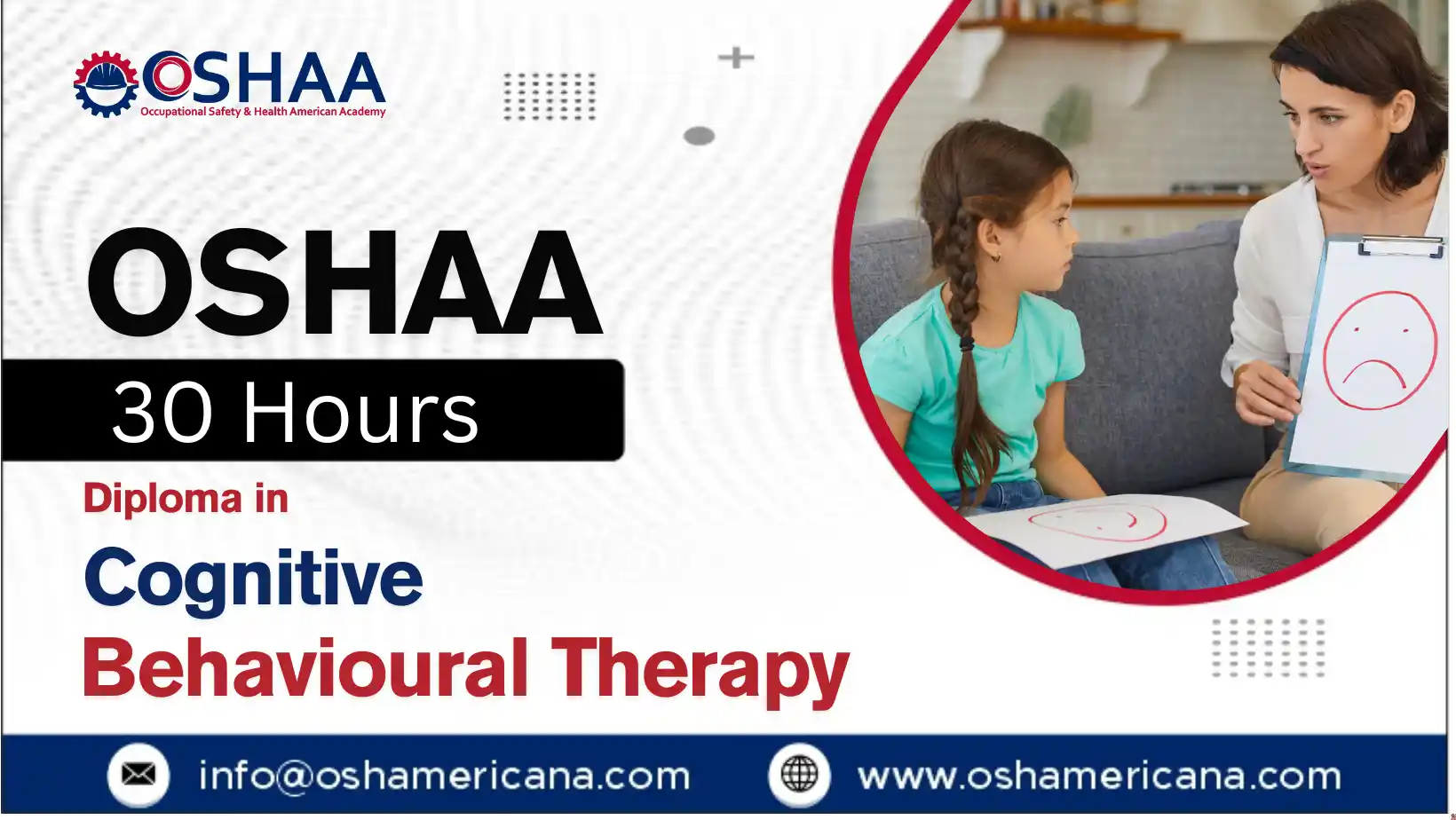Cognitive Behavioural Therapy (CBT) is one of the most widely used and effective therapeutic approaches for treating a range of mental health conditions, including anxiety, depression, stress, and more. If you are looking to develop a deep understanding of CBT and enhance your therapeutic practice, the OSHAA 30-Hours Diploma in Cognitive Behavioural Therapy is the perfect course for you.
Cognitive Behavioural Therapy is a structured, time-limited therapy that focuses on helping individuals identify and challenge negative patterns of thinking and behaviour. By changing these patterns, CBT helps individuals develop healthier ways of thinking, which can lead to improved emotional well-being and behaviour.
The OSHAA 30-Hours Diploma in Cognitive Behavioural Therapy offers a comprehensive introduction to the principles and techniques of CBT. The course is designed for healthcare professionals, counsellors, and individuals interested in enhancing their skills in providing CBT. With a structured approach, participants will gain in-depth knowledge and practical skills that can be applied in real-world settings.
The OSHAA 30-Hours Diploma in Cognitive Behavioural Therapy offers an excellent opportunity for professionals looking to improve their practice and provide effective mental health support to their clients. With evidence-based techniques and a thorough understanding of CBT, this course will equip you with the knowledge and skills needed to make a real difference in the lives of those facing mental health challenges.
OSHAA 30-Hours Diploma in Cognitive Behavioural Therapy
Study Units
Learning Outcomes
- Introduction to Cognitive Behavioural Therapy (3 hours)
- Understand the foundational principles and history of Cognitive Behavioural Therapy.
- Recognise the key components of CBT and its effectiveness in treating mental health conditions.
- Develop a basic understanding of the structure and approach used in CBT sessions.
- Cognitive Behavioural Theory: Key Concepts (4 hours)
- Comprehend the core concepts of CBT, including the relationship between thoughts, emotions, and behaviours.
- Understand cognitive distortions and how they contribute to mental health issues.
- Apply these key concepts to real-life therapeutic scenarios to improve client outcomes.
- The CBT Assessment Process (4 hours)
- Learn the process of conducting a thorough assessment in CBT.
- Identify client-specific issues and determine the most appropriate treatment approach.
- Understand how to set achievable treatment goals and measure progress throughout the therapy process.
- Identifying Negative Thoughts and Cognitive Distortions (4 hours)
- Develop the ability to identify common cognitive distortions in clients’ thinking patterns.
- Recognise the impact of negative thoughts on emotional and behavioural responses.
- Learn how to address and challenge these distortions effectively during therapy.
- Behavioural Techniques in CBT (4 hours)
- Master a variety of behavioural techniques, such as exposure therapy and activity scheduling, to support cognitive change.
- Understand the role of behavioural interventions in CBT for promoting positive changes in client behaviours.
- Learn how to apply these techniques to specific client scenarios to achieve desired outcomes.
- Cognitive Restructuring and Thought Challenging (4 hours)
- Understand the process of cognitive restructuring and its importance in addressing maladaptive thought patterns.
- Learn how to use thought challenging techniques to help clients reframe negative thinking.
- Apply these techniques in practical therapy settings to foster client change and personal growth.
- CBT for Anxiety and Depression (4 hours)
- Learn how to apply CBT techniques specifically for treating anxiety and depression.
- Develop strategies to help clients identify and manage their symptoms effectively.
- Tailor CBT interventions to address the unique needs of clients experiencing anxiety or depression.
- CBT for Stress Management and Other Disorders (3 hours)
- Understand how CBT can be applied to manage stress and other disorders, such as phobias or sleep disturbances.
- Learn how to help clients develop coping mechanisms and resilience through CBT strategies.
- Gain insight into adapting CBT for clients with various psychological disorders and stress-related issues.
- Enhanced Therapeutic Skills
The course equips participants with practical CBT techniques that can be directly applied in therapy sessions, helping to improve client outcomes and therapeutic effectiveness. - Evidence-Based Approach
Cognitive Behavioural Therapy is a well-researched and evidence-based approach to mental health treatment. By mastering CBT techniques, participants will be using one of the most effective therapeutic models in practice today. - Specialised Knowledge for Anxiety and Depression
The course provides in-depth knowledge of applying CBT specifically to treat common conditions such as anxiety and depression, allowing professionals to specialise in these areas of mental health care. - Broad Application to Various Disorders
CBT is versatile and can be adapted to treat a wide range of mental health issues. Participants will learn how to apply CBT techniques for disorders beyond anxiety and depression, such as stress, phobias, and sleep disorders. - Structured Learning and Professional Development
The course offers a structured, clear, and comprehensive curriculum that covers key CBT concepts, enabling participants to develop a deeper understanding of therapeutic approaches and integrate these skills into their practice. - Practical Tools for Client Empowerment
Participants will learn how to empower clients by providing them with practical tools and strategies to manage their thoughts, behaviours, and emotions, fostering greater independence and self-regulation in clients. - Increased Employability and Career Advancement
Completing this diploma enhances your qualifications and makes you more competitive in the job market, opening opportunities for career advancement in mental health settings, private practice, or counselling roles. - Improved Client Relationships
The course focuses on developing essential communication skills and rapport-building techniques, which will enable participants to build stronger, more effective relationships with their clients. - Flexibility and Accessibility
As a 30-hour course, it offers flexibility for busy professionals, enabling them to learn at their own pace and schedule while gaining a comprehensive qualification in Cognitive Behavioural Therapy. - Holistic Approach to Mental Health
By learning both the theoretical and practical aspects of CBT, participants will gain a holistic view of mental health treatment, providing them with the tools to address clients’ issues from a comprehensive, integrative perspective.
These benefits make the OSHAA 30-Hours Diploma in Cognitive Behavioural Therapy an excellent choice for mental health professionals looking to expand their skill set, improve client outcomes, and advance their careers.
- Mental Health Professionals
This course is ideal for psychologists, counsellors, social workers, and therapists who wish to expand their therapeutic skills and incorporate Cognitive Behavioural Therapy techniques into their practice to better support clients with a range of mental health issues. - Healthcare Providers
Nurses, physicians, and other healthcare professionals working in mental health or primary care settings can benefit from this course by learning to identify and address psychological concerns and offering effective CBT-based interventions. - Coaches and Mentors
Coaches or mentors seeking to gain a deeper understanding of CBT techniques for personal and professional development can use the knowledge gained to enhance their ability to support clients in overcoming mental blocks and achieving their goals. - Individuals Aspiring to Enter the Mental Health Field
Those who are looking to start a career in mental health counselling, psychotherapy, or coaching will find this diploma an excellent foundational qualification, providing them with the tools to enter the field with a highly respected therapeutic approach. - Occupational Therapists
Occupational therapists interested in broadening their scope of practice by incorporating CBT techniques into their approach to helping clients manage emotional and psychological challenges will find this course beneficial. - Educators and Trainers
Teachers and educators, especially those working in special education or with at-risk youth, can benefit from CBT skills to support students’ mental well-being and manage behavioural issues in the classroom. - Those Interested in Personal Growth and Development
Anyone with an interest in self-improvement, personal development, or gaining a deeper understanding of mental health can benefit from this course, gaining tools to manage their own thoughts, behaviours, and emotions.
This course is designed for anyone seeking to develop a comprehensive understanding of Cognitive Behavioural Therapy and improve their ability to help others overcome mental health challenges through evidence-based techniques.







